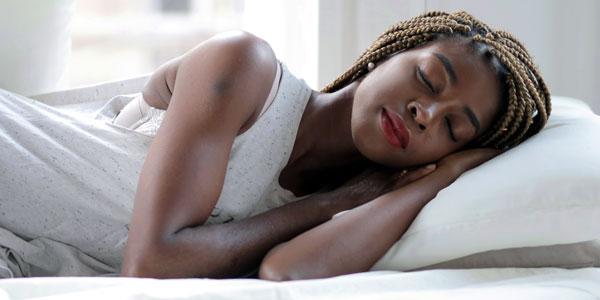Get 40 winks and more this World Sleep Day
- Wits University
17 March is World Sleep Day and sleep is the third pillar of good health after a healthy diet and exercise.

Professor Karine Scheuermaier leads the Sleep Lab in the Brain Function Research Group in the School of Physiology at Wits University and she chairs the South African Society for Sleep and Health (SASSH) scientific sub-committee.
Here are a few tips for a good night’s sleep and why it’s so important:
Why is sleeping well important?
When we do not sleep well, we immediately feel the effects: we are grumpy, irritable, have problems learning or interacting with our peers. That is because we do important brain repair and memory consolidation during sleep.
If we do not sleep well persistently, we are at higher risk of developing hypertension, cardiovascular diseases, pre-diabetes, and underperforming chronically and developing mood disorders like depression.
What does it mean to ‘not sleep well’?
Firstly, it is just the way we wake up and say ‘Oh, I didn’t sleep well’. We may say this when we have slept less than 7 hours in a night, or when it took us a long time (more than 30 minutes) to fall asleep, if we woke up too many times during the night, or we just feel our sleep wasn’t restful.
So how can we sleep better?
- Have regular wakeup and bedtimes.
- Avoid artificial light before your bedtime, in particular smartphones! Even with night-time settings, the brightness is much more than what we should be exposed to. Our sleep is regulated by exposure to light so if we get too much light at night, it pushes our bedtimes to a later time, and since we have to wake up for work, school, and looking after our families, we end up curtailing our sleep.
- Avoid big meals/alcohol/stimulants three hours within your bedtime. These all interfere with your sleep!
- Schedule your ‘worry’ time during the day – have an actual timeslot dedicated to ‘worries’, even if you do not solve them. This will avoid those worries from popping in to your head just before bedtime.
- Exercise during the day but not within two to three hours before bedtime. But do exercise, even if only walking for 10 minutes!
- Get natural light during the day so that your internal clock can be well aligned with the Earth’s 24-hour day.
How can I find out if I have an actual ‘sleep disorder’?
- The most common sleep disorder is ‘insomnia disorder’, which we define as having a sleep complaint and difficulties functioning during the day as a result, for more than three months. Sleep complaints are usually: ‘It takes me a long time to fall asleep’ or ‘I keep waking up spontaneously several times at night’ or ‘I don’t sleep enough although I spend eight hours in bed’. We had a lot of this during Covid lockdown, and people with insomnia had higher anxiety and depression symptoms.
- Obstructive Sleep Apnoea is caused by our upper airways being obstructed and not letting air through (apnoea) while sleeping. This leads to waking up several times during the night without being aware of it, resulting in non-restful sleep. The obstructions (apnoea) create drops in oxygen, which are associated with cardiovascular disease. People with sleep apnoea often snore, complain of non-restorative sleep and of feeling sleepy during the day. In an older population of rural South Africa, we found one person out of three had this disorder and when they had it, they had much higher cardiovascular disease risk markers. We also called for an urgent set up of sleep apnoea diagnosis in Africa.
Exciting news on sleep in South Africa!
Thanks to a grant from the Wellcome Trust, a team of South African sleep researchers will soon begin investigating the relationship between changes in sleep and circadian rhythms during adolescence and how this may impact mental health. Watch this space!
Read more Wits University sleep-related research about how you can save your sanity with sleep and how to tell if you’re a good or bad sleeper.
Visit the South African Society for Sleep Health (SASSH) website for more on sleep disorders, sleep tips, and sleep-related research.
